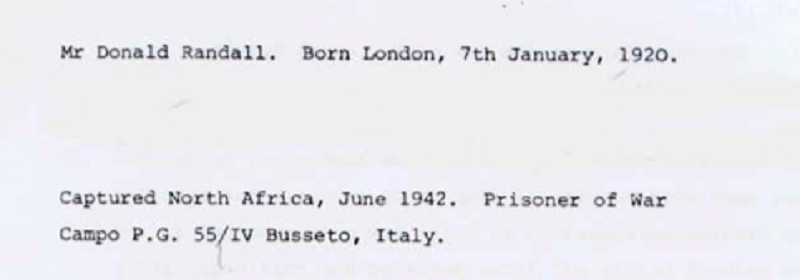Donald Randall
(Londra, 1920)
Northamptonshire Regiment
Donald was captured in North Africa in June 1942; he was 22 at the time. He was transferred to PG 55 Busseto and assigned to the IV detachment of the camp, a farm (the «Cascina Stralocchio»), in Stagno Lombardo (Cremona). On 8 September 1943, the news of the Armistice spread like wildfire.
The local families helped the PoWs avoid recapture. Donald recalled that he was hidden inside a hole in the ground with a camouflaged entrance. The foreman’s family, especially his daughter Maria, actively aided the PoWs.
Donald’s memoir, MSMT: <https://archives.msmtrust.org.uk/pow-index/randall-donald/>
Unlike many other PoWs from PG 55, who decided to reach Switzerland, Donald and his comrade George Hunt (Durham Light Infantry) chose to go south towards the Allied armies. They received the population’s help during their journey: in Langhirano, near Parma, but also in isolated farms and houses, which dotted the farmland that they crossed in the following months.
Roughly two weeks before Christmas, they reached Pratoianni (Rieti), a district of Concerviano. Here, they were welcomed by Pasquetta. They planned to resume their march in a few days, but their host convinced them to stay until the end of January 1944. Another family, the Chiarinellis, who had moved to the countryside to escape the Allied bombings of their town, also helped the escapees in this period, just like many other local people who visited Pasquetta’s home to bring them food.
When they learned about the Anzio landings on 22 January 1944, Donald and George left their hideout to try and reach the Allied forces. However, they were forced back very soon because the Germans launched a furious counter-attack. They stopped near Velletri, hidden in a forest and fed by the local population. German troops, however, soon began to patrol the area, forcing them to move. At this point, they decided to turn back and return to Pratoianni, where Pasquetta welcomed them once again.
They remained there until April, when their presence was reported to the local fascist authorities, and the enemy ransacked the village. The Nazi-Fascists threatened Pasquetta and her family with deportation to Germany, and their house was pillaged. However, Donald and George managed to get away.
As it was dangerous to stay in the area, they decided to go back to the north, hoping to cross the Alps, reach France and, from there, cross the border with Spain. In mid-May 1944, they were captured by a fascist patrol and imprisoned in Rocca Albornoziana (Spoleto) for a month. They were questioned harshly; their captors wanted to know who had helped them during their escape in the previous months.
They were transferred to a prison at Perugia, where they endured more questioning, then to Arezzo, and were finally deported to Germany, in a working camp where they mined lignite. They managed to go back home only after the end of the war.
Shortly before my marriage, in 1949, I returned to Italy and visited the Chiarinelli family in Rieti. I then visited Pratoianni and saw Pasquetta, who fell to her knees before me and thanked God I was safe.
Donald returned to Italy again in 1983 to see the places of his imprisonment and escape and thank, once more, all who had helped him.
Related camps
Sources
-
Roger Absalom, A Strange Alliance. Aspects of escape and survival in Italy 1943-45, Firenze, Olschki,1991 (trad. it., L’alleanza inattesa. Mondo contadino e prigionieri alleati in fuga in Italia 1943-1945, Bologna, Pendagron, 2011).
-
Janet Kinrade Dethick, The Long Trail Home, Lulu.com, 2016 (trad. it., La lunga via del ritorno: i prigionieri alleati in Umbria (1943-44), Perugia, Morlacchi, 2018).
-
Donald Randall, memoria privata, 1983, Monte San Martino Archive:< https://archives.msmtrust.org.uk/pow-index/randall-donald/>

